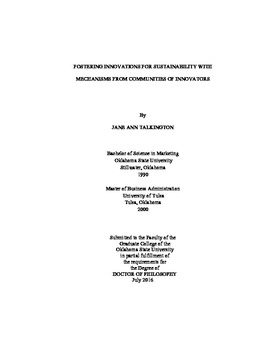| dc.contributor.advisor | Watters, Craig E. | |
| dc.contributor.author | Talkington, Jane Ann | |
| dc.date.accessioned | 2017-02-22T22:10:48Z | |
| dc.date.available | 2017-02-22T22:10:48Z | |
| dc.date.issued | 2016-07 | |
| dc.identifier.uri | https://hdl.handle.net/11244/48877 | |
| dc.description.abstract | Universities are positioned to play a pivotal role in educating a populous with the ability to operate the planet in accordance with sustainability principles and practices. Within their responsibility is the task to prepare citizens to operate future civilizations. This is in addition to the previous missions of educating for inquiry, scholarship, or career development. Increasingly, universities are recognizing that meaningful, deep learning happens outside the curriculum and in social settings, some of which are designed specifically to foster innovation and entrepreneurship through innovation ecosystems. The result has been the creation of live-learn dormitories, living labs, innovation campuses, corporate co-location buildings, and innovation districts. In parallel, global societies are also gradually realizing that any peaceful and prosperous society in the future will require citizens who cultivate the sustainability ethic necessary to innovate solutions to the environmental challenges and social equity problems that threaten the continuation of humanity. | |
| dc.description.abstract | The challenge facing higher education then becomes the question of what new role the university can envision for itself that propels them to create or participate in the creation of a physical place with an entrepreneurial culture and a social support network capable of fostering the development of system-thinking innovators of sustainable solutions. By applying the process tracing method within a historical research methodology, this dissertation reviews past communities of innovators as found in intentional communities and places of innovation to identify the mechanisms used to approach their goals. The intent of the research is to understand more clearly how others in the past approached what was perceived as unimaginable so that this generation can build the confidence and courage to tackle humanity's goals that now seem unachievable. This dissertation finds that those mechanisms are open source, iterative processes, and proximity. This dissertation concludes with implementation scenarios of how these mechanisms can be integrated into strategy by higher education institutions that are striving to create the environments capable of fueling the development of sustainability-oriented innovations. | |
| dc.format | application/pdf | |
| dc.language | en_US | |
| dc.rights | Copyright is held by the author who has granted the Oklahoma State University Library the non-exclusive right to share this material in its institutional repository. Contact Digital Library Services at lib-dls@okstate.edu or 405-744-9161 for the permission policy on the use, reproduction or distribution of this material. | |
| dc.title | Fostering innovations for sustainability with mechanisms from communities of innovators | |
| dc.contributor.committeeMember | Mansy, Khaled | |
| dc.contributor.committeeMember | Stoecker, Arthur | |
| dc.contributor.committeeMember | Armstrong, Cosette M. | |
| osu.filename | Talkington_okstate_0664D_14746.pdf | |
| osu.accesstype | Open Access | |
| dc.type.genre | Dissertation | |
| dc.type.material | Text | |
| thesis.degree.discipline | Environmental Science | |
| thesis.degree.grantor | Oklahoma State University | |
